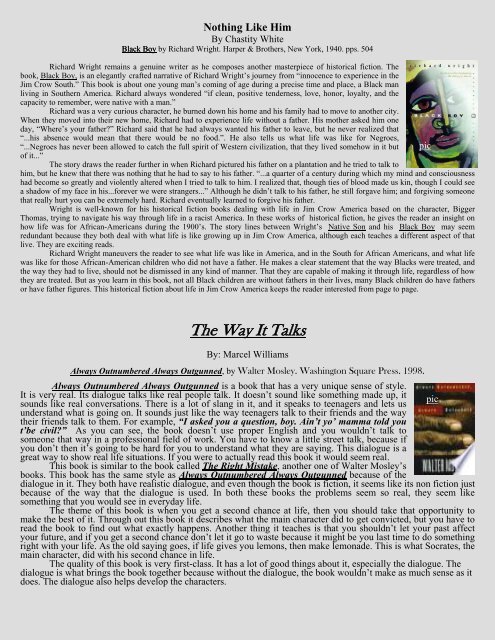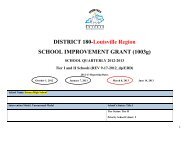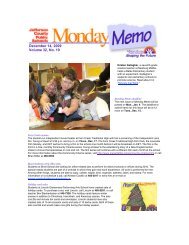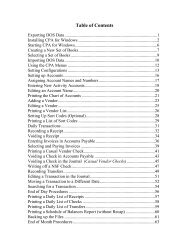Inside this Issue - Jefferson County Public Schools
Inside this Issue - Jefferson County Public Schools
Inside this Issue - Jefferson County Public Schools
You also want an ePaper? Increase the reach of your titles
YUMPU automatically turns print PDFs into web optimized ePapers that Google loves.
Nothing Like Him<br />
By Chastity White<br />
Black Boy by Richard Wright. Harper & Brothers, New York, 1940. pps. 504<br />
Richard Wright remains a genuine writer as he composes another masterpiece of historical fiction. The<br />
book, Black Boy, is an elegantly crafted narrative of Richard Wright’s journey from “innocence to experience in the<br />
Jim Crow South.” This book is about one young man’s coming of age during a precise time and place, a Black man<br />
living in Southern America. Richard always wondered “if clean, positive tenderness, love, honor, loyalty, and the<br />
capacity to remember, were native with a man.”<br />
Richard was a very curious character, he burned down his home and his family had to move to another city.<br />
When they moved into their new home, Richard had to experience life without a father. His mother asked him one<br />
day, “Where’s your father?” Richard said that he had always wanted his father to leave, but he never realized that<br />
“...his absence would mean that there would be no food.”. He also tells us what life was like for Negroes,<br />
“...Negroes has never been allowed to catch the full spirit of Western civilization, that they lived somehow in it but pic<br />
of it...”<br />
The story draws the reader further in when Richard pictured his father on a plantation and he tried to talk to<br />
him, but he knew that there was nothing that he had to say to his father. “...a quarter of a century during which my mind and consciousness<br />
had become so greatly and violently altered when I tried to talk to him. I realized that, though ties of blood made us kin, though I could see<br />
a shadow of my face in his...forever we were strangers...” Although he didn’t talk to his father, he still forgave him; and forgiving someone<br />
that really hurt you can be extremely hard. Richard eventually learned to forgive his father.<br />
Wright is well-known for his historical fiction books dealing with life in Jim Crow America based on the character, Bigger<br />
Thomas, trying to navigate his way through life in a racist America. In these works of historical fiction, he gives the reader an insight on<br />
how life was for African-Americans during the 1900’s. The story lines between Wright’s Native Son and his Black Boy may seem<br />
redundant because they both deal with what life is like growing up in Jim Crow America, although each teaches a different aspect of that<br />
live. They are exciting reads.<br />
Richard Wright maneuvers the reader to see what life was like in America, and in the South for African Americans, and what life<br />
was like for those African-American children who did not have a father. He makes a clear statement that the way Blacks were treated, and<br />
the way they had to live, should not be dismissed in any kind of manner. That they are capable of making it through life, regardless of how<br />
they are treated. But as you learn in <strong>this</strong> book, not all Black children are without fathers in their lives, many Black children do have fathers<br />
or have father figures. This historical fiction about life in Jim Crow America keeps the reader interested from page to page.<br />
The Way It Talks<br />
By: Marcel Williams<br />
Always Outnumbered Always Outgunned, by Walter Mosley. Washington Square Press. 1998.<br />
Always Outnumbered Always Outgunned is a book that has a very unique sense of style.<br />
It is very real. Its dialogue talks like real people talk. It doesn’t sound like something made up, it<br />
pic<br />
sounds like real conversations. There is a lot of slang in it, and it speaks to teenagers and lets us<br />
understand what is going on. It sounds just like the way teenagers talk to their friends and the way<br />
their friends talk to them. For example, “I asked you a question, boy. Ain’t yo’ mamma told you<br />
t’be civil?” As you can see, the book doesn’t use proper English and you wouldn’t talk to<br />
someone that way in a professional field of work. You have to know a little street talk, because if<br />
you don’t then it’s going to be hard for you to understand what they are saying. This dialogue is a<br />
great way to show real life situations. If you were to actually read <strong>this</strong> book it would seem real.<br />
This book is similar to the book called The Right Mistake, another one of Walter Mosley’s<br />
books. This book has the same style as Always Outnumbered Always Outgunned because of the<br />
dialogue in it. They both have realistic dialogue, and even though the book is fiction, it seems like its non fiction just<br />
because of the way that the dialogue is used. In both these books the problems seem so real, they seem like<br />
something that you would see in everyday life.<br />
The theme of <strong>this</strong> book is when you get a second chance at life, then you should take that opportunity to<br />
make the best of it. Through out <strong>this</strong> book it describes what the main character did to get convicted, but you have to<br />
read the book to find out what exactly happens. Another thing it teaches is that you shouldn’t let your past affect<br />
your future, and if you get a second chance don’t let it go to waste because it might be you last time to do something<br />
right with your life. As the old saying goes, if life gives you lemons, then make lemonade. This is what Socrates, the<br />
main character, did with his second chance in life.<br />
The quality of <strong>this</strong> book is very first-class. It has a lot of good things about it, especially the dialogue. The<br />
dialogue is what brings the book together because without the dialogue, the book wouldn’t make as much sense as it<br />
does. The dialogue also helps develop the characters.

















